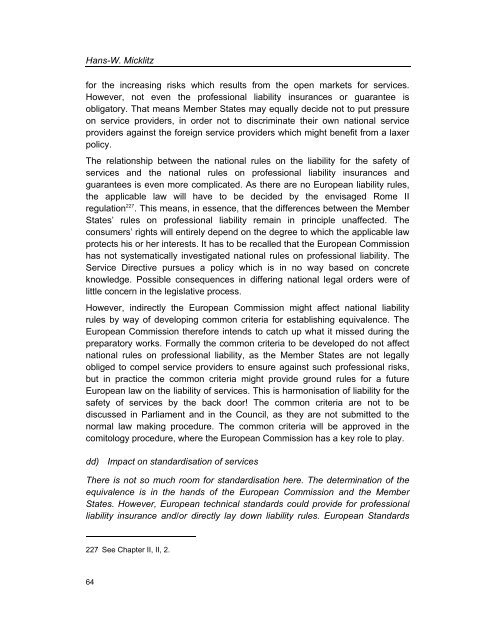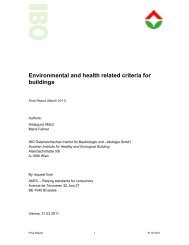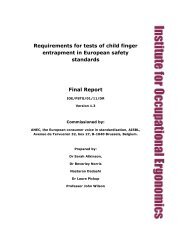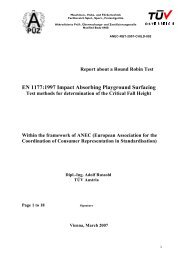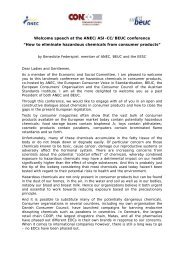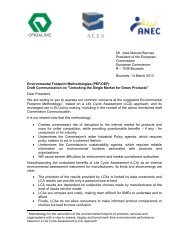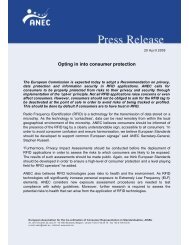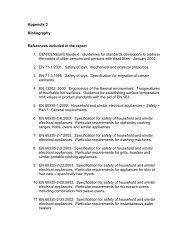Services Standards: Defining the Core Consumer Elements ... - ANEC
Services Standards: Defining the Core Consumer Elements ... - ANEC
Services Standards: Defining the Core Consumer Elements ... - ANEC
You also want an ePaper? Increase the reach of your titles
YUMPU automatically turns print PDFs into web optimized ePapers that Google loves.
Hans-W. Micklitz<br />
for <strong>the</strong> increasing risks which results from <strong>the</strong> open markets for services.<br />
However, not even <strong>the</strong> professional liability insurances or guarantee is<br />
obligatory. That means Member States may equally decide not to put pressure<br />
on service providers, in order not to discriminate <strong>the</strong>ir own national service<br />
providers against <strong>the</strong> foreign service providers which might benefit from a laxer<br />
policy.<br />
The relationship between <strong>the</strong> national rules on <strong>the</strong> liability for <strong>the</strong> safety of<br />
services and <strong>the</strong> national rules on professional liability insurances and<br />
guarantees is even more complicated. As <strong>the</strong>re are no European liability rules,<br />
<strong>the</strong> applicable law will have to be decided by <strong>the</strong> envisaged Rome II<br />
regulation 227 . This means, in essence, that <strong>the</strong> differences between <strong>the</strong> Member<br />
States’ rules on professional liability remain in principle unaffected. The<br />
consumers’ rights will entirely depend on <strong>the</strong> degree to which <strong>the</strong> applicable law<br />
protects his or her interests. It has to be recalled that <strong>the</strong> European Commission<br />
has not systematically investigated national rules on professional liability. The<br />
Service Directive pursues a policy which is in no way based on concrete<br />
knowledge. Possible consequences in differing national legal orders were of<br />
little concern in <strong>the</strong> legislative process.<br />
However, indirectly <strong>the</strong> European Commission might affect national liability<br />
rules by way of developing common criteria for establishing equivalence. The<br />
European Commission <strong>the</strong>refore intends to catch up what it missed during <strong>the</strong><br />
preparatory works. Formally <strong>the</strong> common criteria to be developed do not affect<br />
national rules on professional liability, as <strong>the</strong> Member States are not legally<br />
obliged to compel service providers to ensure against such professional risks,<br />
but in practice <strong>the</strong> common criteria might provide ground rules for a future<br />
European law on <strong>the</strong> liability of services. This is harmonisation of liability for <strong>the</strong><br />
safety of services by <strong>the</strong> back door! The common criteria are not to be<br />
discussed in Parliament and in <strong>the</strong> Council, as <strong>the</strong>y are not submitted to <strong>the</strong><br />
normal law making procedure. The common criteria will be approved in <strong>the</strong><br />
comitology procedure, where <strong>the</strong> European Commission has a key role to play.<br />
dd) Impact on standardisation of services<br />
There is not so much room for standardisation here. The determination of <strong>the</strong><br />
equivalence is in <strong>the</strong> hands of <strong>the</strong> European Commission and <strong>the</strong> Member<br />
States. However, European technical standards could provide for professional<br />
liability insurance and/or directly lay down liability rules. European <strong>Standards</strong><br />
227 See Chapter II, II, 2.<br />
64


